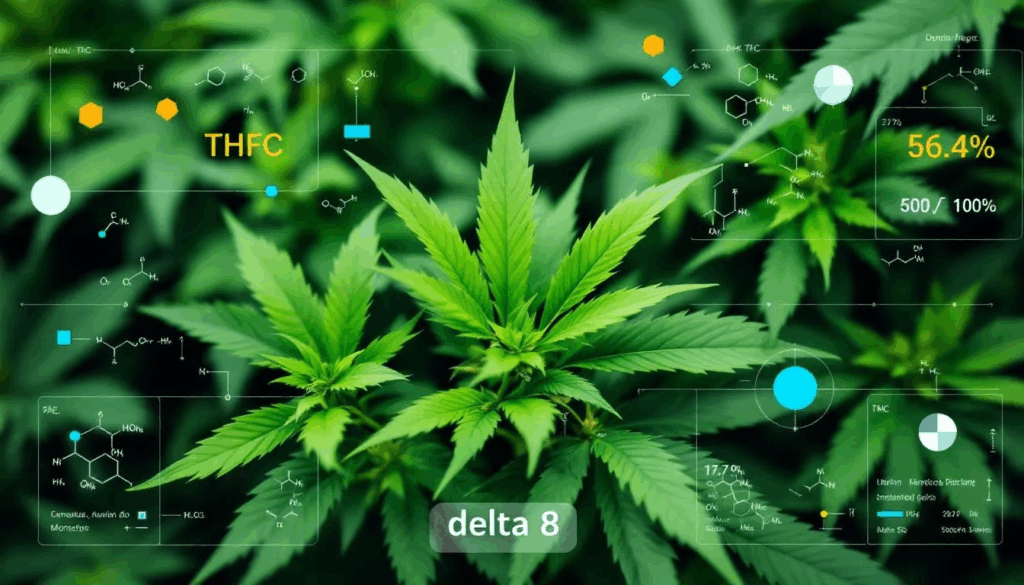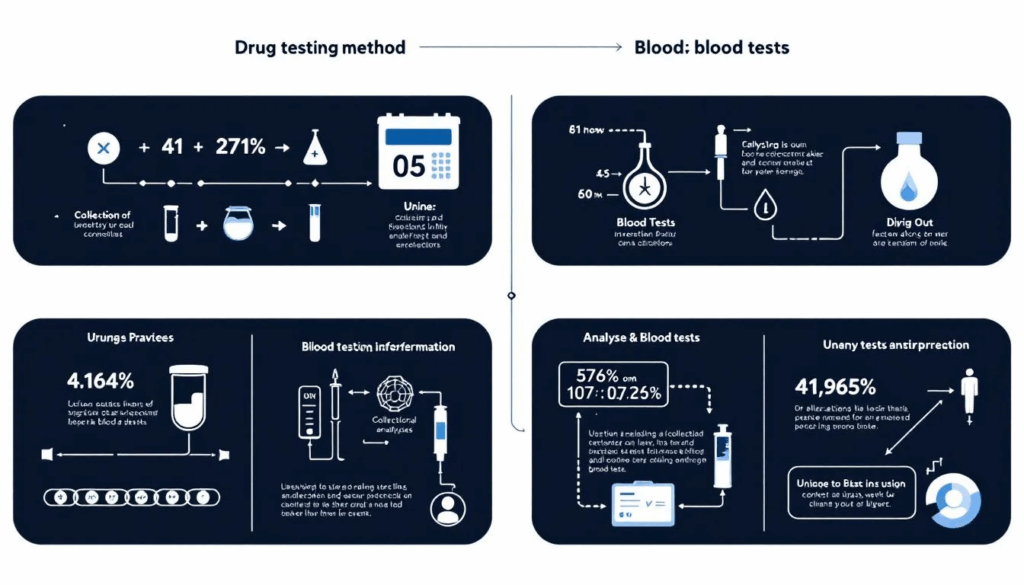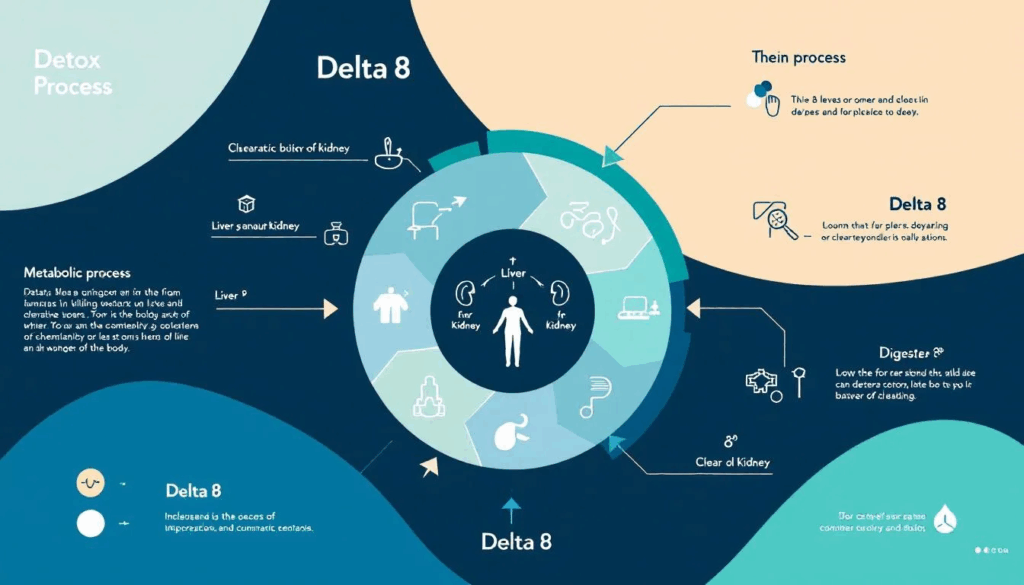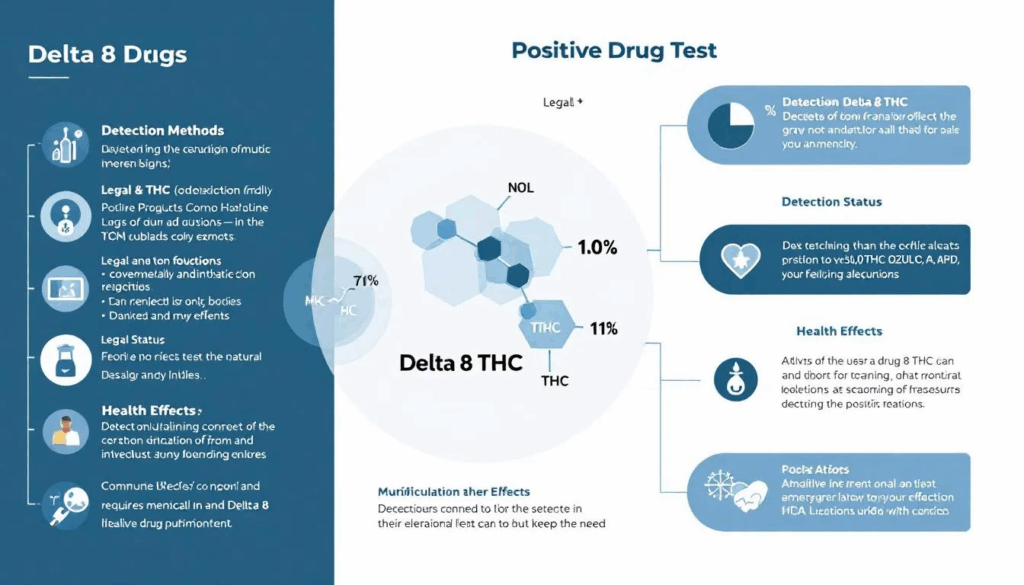How long does Delta 8 stay in your system? Detection times for Delta-8 THC range from a few days to several weeks, based on usage habits and metabolism. In this guide, you’ll learn about the factors that influence its duration in your system.
Key Takeaways
- Delta-8 THC, derived from hemp, offers milder psychoactive effects and is used for relaxation and pain relief, but its legal status varies by state.
- Key factors influencing how long Delta-8 stays in your system include dosage, frequency of use, metabolism, and body fat percentage.
- Delta-8 can be detected through various drug tests, with urine tests showing the longest detection window of up to a few weeks for heavy users.
Understanding Delta-8 THC

Delta-8 THC is a fascinating chemical compound derived from the cannabis plants sativa plant. Unlike its more famous cousin, Delta-9 THC, Delta-8 offers a slightly different chemical structure, resulting in milder psychoactive effects. Many users find Delta-8 appealing for its ability to provide relaxation, pain relief, and a gentle euphoria without the intense high associated with Delta-9.
Derived from hemp, Delta-8 THC has gained popularity for its balanced effects, often used to promote sleep, stimulate appetite, and enhance overall relaxation. The extraction process typically involves converting cannabidiolic acid (CBDA) into CBD through decarboxylation before further processing into Delta-8 THC from cannabis and hemp plants.
However, the legal status of Delta-8 varies widely across states. Some regions embrace it, while others impose restrictions or outright bans. Its legal classification often hinges on its relation to marijuana laws, making it legal in some areas where marijuana remains prohibited.
How Delta-8 is Metabolized
When you consume Delta-8 THC, your body processes get to work metabolizing it into various metabolites. This process mainly occurs in the liver function, where enzymes facilitate both oxidation and hydroxylation. These metabolic processes are complex and can be influenced by several factors, such as your metabolism rate, age, and overall activity level.
Age and overall health also play significant roles in how quickly Delta-8 THC is processed. Younger individuals with robust health and active lifestyles may metabolize Delta-8 more efficiently than older or less healthy individuals. These factors help you anticipate Delta-8’s duration in your system.
Factors Influencing Delta-8 Duration
The retention time of Delta-8 in your system is influenced by various factors influence. These factors can impact the duration it stays detectable, including:
- Dosage
- Frequency of use
- Metabolism
- Body fat percentage These elements play crucial roles.
These insights allow for better management of Delta-8 use and prediction of detection times.
Dosage and Frequency
Dosage and frequency significantly impact how long Delta-8 stays in your system:
- Higher doses lead to longer-lasting and more intense effects, which can prolong detectability in drug tests.
- Frequent or heavy users are more likely to test positive for longer periods due to the accumulation of Delta-8 in the body.
- Occasional users might test positive for up to a week.
- Chronic users could have detectable levels for several weeks. How long does delta 8 stay in your system?
The half-life of Delta-8 THC is approximately 30 minutes, meaning that it takes about half an hour for the concentration of Delta-8 in the bloodstream to reduce by half. However, the metabolites can linger much longer, affecting drug test results.
Metabolism and Body Fat
Your metabolism and body fat percentage also influence how long Delta-8 stays in your system. THC is stored in fat cells, so individuals with higher body fat percentages may retain Delta-8 metabolites for longer periods. This means that even if your metabolic rate is high, the presence of more fat cells can slow the elimination process.
Engaging in physical activity and maintaining a healthy diet can help expedite the detox process. Burning fat releases stored THC metabolites, helping clear them from your system. Understanding these factors is vital for anyone looking to manage their Delta-8 use responsibly.
Detection Windows for Different Drug Tests

Different drug tests have varying detection windows for Delta-8 THC. The most common tests include various drug tests such as urine, blood, saliva, and hair tests, each with its own timeframe for detecting Delta-8.
Awareness of these windows allows for better preparation for drug tests and management of usage.
Urine Tests
Urine tests are the most common method for detecting Delta-8 THC. For occasional users, Delta-8 is typically detectable for about a week, while for frequent or heavy users, the detection period can extend up to a few weeks or more.
This variation highlights the need to understand your usage patterns for anticipating your upcoming drug test results and being drug tested, especially in the context of drug testing.
Blood Tests
Blood tests offer a shorter detection window compared to urine tests. Delta-8 THC can be detected in blood for up to 2 days for occasional users. Blood tests are more suited for identifying recent use than long-term consumption.
Saliva Tests
Saliva test are another method for detecting Delta-8 THC, typically identifying usage within a 24-hour window for single-use cases. Heavy users, however, might test positive for up to 29 days, making saliva tests useful for both short-term and more extended detection.
Hair Tests
Hair follicle tests provide the longest detection window for Delta-8 THC, capable of revealing usage for up to 90 days. Hair tests remain detectable for identifying long-term usage patterns, providing a comprehensive view compared to other methods.
Clearing Delta-8 From Your System

If you’re looking to clear Delta-8 from your system, there are several effective strategies. Staying hydrated is crucial, as it helps body flush toxins and promotes frequent urination, aiding in detoxification. Staying well-hydrated speeds up the elimination of Delta-8 metabolites.
Physical activity is another key factor. Engaging in regular exercise helps burn fat where THC metabolites are stored, enhancing their clearance from your system. Hydration combined with physical activity significantly expedites detoxification.
Structured detox programs for Delta-8 THC are available, often combining hydration, dietary adjustments, and physical activity to clear the psychoactive substance effectively.
Impact of Delta-8 on Drug Tests

Delta-8 THC can affect the outcomes of drug tests. Awareness of this potential impact is crucial. Key points to understand include:
- Drug tests look for THC metabolites to identify Delta-8 usage.
- Delta-8 and Delta-9 THC produce the same metabolites.
- Standard drug tests cannot differentiate between Delta-8 and Delta-9 THC.
- This can potentially cause false positives. This is essential to understand, especially before a drug test.
Most drug tests are designed to detect THC-COOH, a common metabolite of both Delta-8 and Delta-9 THC. If you’ve consumed Delta-8, you’re likely to test positive for THC, which can have significant implications depending on the test’s context.
Seeking Help for Delta-8 Use
Seeking professional help is a critical step if you or someone you know struggles with Delta-8 use. Medical professionals often recommend outpatient treatment programs tailored to address substance use disorders related to Delta-8 THC. They offer comprehensive treatment plans that include substance abuse treatment, therapy, and counseling at a treatment center.
Therapies like cognitive behavioral therapy (CBT) and group therapy effectively address Delta-8 dependence, helping individuals understand usage patterns and develop coping strategies.
Mental health support, including counseling and addiction treatment support groups, is essential for lasting recovery and mental health treatment. These resources provide a supportive community and tools to help individuals overcome Delta-8 THC dependence.
Summary
Understanding how long Delta-8 THC stays in your system is vital for anyone who uses this cannabinoid. Several factors, including dosage, frequency, metabolism, and body fat percentage, influence its duration in the body. Different drug tests have varying detection windows, making it essential to be aware of how long Delta-8 can be detected.
To clear Delta-8 from your system, staying hydrated, engaging in physical activity, and considering detox programs are effective strategies. If you’re facing challenges with Delta-8 use, professional help and support groups can provide the necessary resources for recovery. Armed with this knowledge, you can navigate your Delta-8 use more confidently and responsibly.
Frequently Asked Questions
How long does Delta-8 THC stay in your system?
Delta-8 THC can remain in your system for a few days to several weeks, influenced by factors such as dosage, frequency of use, metabolism, and body fat percentage. Therefore, it’s important to consider these variables if you’re concerned about drug testing or overall health.
Can Delta-8 THC make you fail a drug test?
Yes, Delta-8 THC can result in a positive drug test as it produces metabolites similar to those of Delta-9 THC, which are identified in standard drug screenings.
What are the best ways to clear Delta-8 THC from your system?
To effectively clear Delta-8 THC from your system, focus on staying hydrated, increasing physical activity, and exploring detox programs. These strategies can significantly aid in expediting the process.
How does body fat percentage affect the retention of Delta-8 THC?
Higher body fat percentages can indeed lead to longer retention of Delta-8 THC, as THC is stored in fat cells. This means individuals with more body fat may experience prolonged effects from Delta-8 THC.
What types of drug tests can detect Delta-8 THC?
Delta-8 THC can be identified through urine, blood, saliva, and hair tests, each with different detection windows. If you’re concerned about testing, it’s important to be aware of these methods.
Author
-
As the Medical Director at New England Psychiatric Consultants, I’m dedicated to elevating mental health care through compassionate, evidence-based practices. With a robust clinical background and leadership experience, I work closely with multidisciplinary teams to design and deliver comprehensive outpatient and consultative psychiatric services. I’m passionate about championing innovative treatment approaches and optimizing patient journeys from assessment through recovery.
Key Expertise & Achievements
-
Leadership in clinical operations, quality assurance, and regulatory compliance
-
Implementation of integrated care models that enhance patient access and outcomes
-
Expertise across mood disorders, anxiety, and serious mental illness
-
Advanced training in psychopharmacology, psychotherapy, and collaborative care strategies
Professional Approach
Driven by empathy, teamwork, and data-informed decisions, I strive to foster environments where clinicians and patients alike feel supported. Whether guiding team development, streamlining care pathways, or navigating complex cases, I take a thoughtful, solution-oriented stance. -
